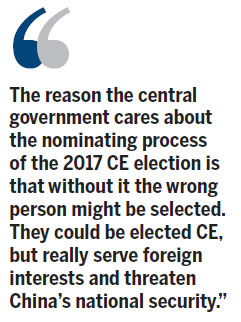Patriotism vital to national security
Updated: 2014-06-13 05:25
By Yang Sheng(HK Edition)
|
|||||||
'Love the Nation, Love Hong Kong". This is the direct translation from a Chinese phrase which has always been a hot issue in debates over the implementation of universal suffrage in the SAR. At a recent forum on Hong Kong's constitutional development, Legislative Council (LegCo) members including LegCo President Jasper Tsang, Democratic Party Chairwoman Emily Lau, former secretary for security Regina Ip and Starry Lee, of the Democratic Alliance for Betterment and Progress of Hong Kong (DAB), offered their own views.
Traditionally, the pro-establishment parties are also referred to as the "Love the Nation, Love Hong Kong" (patriotic) camp. Zhang Xiaoming, director of the Central People's Government's Liaison Office in the HKSAR (Liaison Office), told visiting LegCo members in Shanghai in April the central government had never said all "pan-democracy" supporters were not patriots. Many opposition politicians also believe they are patriots. Emily Lau has said: "I love the nation as well as Hong Kong more than anything else." Even Tai Yiu-ting, founder of the "Occupy Central" campaign, told a live radio show he was more patriotic than anyone else on the show.
Is there a standard for patriotism or for "Love the Nation, Love Hong Kong"? Currently, debate over implementing universal suffrage in the SAR is heating up. The government is expected to announce the next stage of the public consultation on constitutional reform soon. The illegal "Occupy Central" movement is planning an electronic poll on June 22. So it is time a clear definition was given to the term "Love the Nation, Love Hong Kong". This is essential for future discussion.

Obviously it is difficult to write "Love the Nation, Love Hong Kong" into law. It is also hard to define the word "love" in the Basic Law. But this does not mean there is no criterion for defining it. There are three requirements: 1) unconditionally support the resumption of sovereign rule over Hong Kong by the nation; 2) faithfully abide by the Basic Law; and 3) do nothing which harms the interests of Hong Kong or the nation. We cannot conclude all members of the opposition camp are unpatriotic. But we can use these three requirements to see whether people really are patriots.
Some politicians in Hong Kong have underestimated the wisdom of the public. They believe they can call themselves patriots simply because it is hard to define "Love the Nation, Love Hong Kong". But Chinese historian Cai Dongfan (1877-1945) once said, "Those who think they can fool the rest of the nation have no idea how easy it is for people to find out what they are made of by what they say and do." That is an accurate analysis of these self-proclaimed "patriots".
Claudia Mo, of the Civic Party, once likened "Love the Nation, Love Hong Kong" as an "unauthorized building of words". But this was a lie. The term is one of the requirements necessary for being Hong Kong's Chief Executive (CE). The reason the central government cares about the nomination process of the 2017 CE election is that without it the wrong person might be selected. They could be elected CE, but really serve foreign interests and threaten China's national security.
Former paramount leader Deng Xiaoping once told a delegation of Hong Kong leaders: "There is indeed a line and criterion on Hong Kong people governing Hong Kong They must be patriots." He defined the word "patriot" as "one who respects the (Chinese) nation, sincerely supports the resumption of sovereign rule over Hong Kong by the motherland and does nothing that will harm Hong Kong's prosperity and stability".
"Those meeting these requirements are patriots no matter what they believe in We don't demand their allegiance to the mainland's socialist system as long as they love the nation as well as Hong Kong," he added. Deng was a great man, ahead of his time.
Emily Lau once said, "I love the nation and Hong Kong but not the
(Communist) Party." She is probably not the only political figure in Hong Kong who feels this way. Is this acceptable? Deng had an answer for this, too. He was quoted as telling his Hong Kong guests, "We embrace everyone who takes pride in our national identity and cares for the nation as a whole, no matter what his/her political lineage is, including those who have no kind words for the Communist Party."
This means all political parties - pro-establishment or opposition - should put aside their differences and unite to protect the nation's interests. Everyone must match their words with action.
The author is a veteran current affairs commentator.
(HK Edition 06/13/2014 page9)